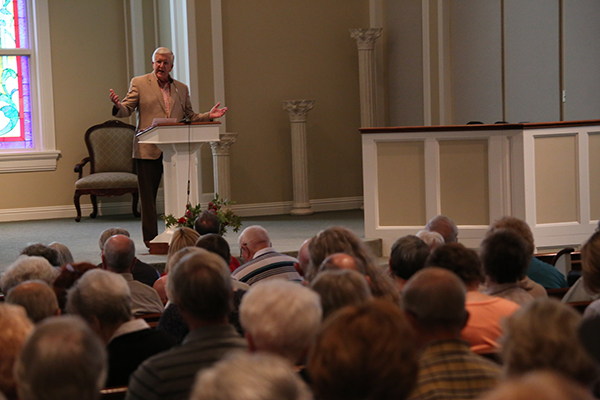By Grace Thornton
The Alabama Baptist
Harold Fanning says it doesn’t matter whether it’s a big church or a small, rural church in Morgan County, the sight of the pulpit still gets to him.
Just standing there it preaches a message all by itself, he said.
It lets the whole room — and whole world — know the preaching of the Word is central.
“After all these years I still get this holy fear every time I look at that pulpit,” said Fanning, a retired pastor who now serves as prayer meeting pastor and in the area of transitional pastoral counseling for Whitesburg Baptist Church, Huntsville. “The privilege that God has given me to stand behind it and speak for Him, that’s something I’ll never take for granted.”
That’s the essence of a kind of preaching he calls “old time gospel preaching” — where a man passionately proclaims a message not just about Christ but on behalf of Christ.
“As a preacher you know you’re a dying man preaching to dying people. You believe what you’re saying,” Fanning said. “We have a word from God for the people, and we preach a message with such passion that the congregation really is convinced that we believe what we’re saying.”
A pure kind of preaching
Robert Smith, professor of Christian preaching and Charles T. Carter Baptist Chair of Divinity at Samford University’s Beeson Divinity School, said it’s a pure kind of preaching. The heart and soul of the message never changes.
“Old time gospel preaching must be based on what Paul said to the Galatians — if an angel from heaven comes and preaches any of the gospel than that which I have brought to you, then let even the angel be accursed (Gal. 1:8),” Smith said.
It’s saying the same thing — the tenets and foundations of the gospel — in fresh new ways, he said.
“It’s like having chicken,” Smith said. “My mother was a tremendous cook, but she would always cook more chicken on Sundays than we needed.”
Then the rest of the week the Smith family would see that chicken served over and over again in different ways — chicken cordon bleu, chicken soup, chicken and dumplings and more.
“But it was always the same chicken, the same basic thing is the chicken,” Smith said. “It’s just presented again and again in ways that are fresh, inviting, invigorating and engaging so that people see and feel the passion behind it without losing the core of what it is.”
Starts with learning
For it to be what it’s supposed to be there has to be some learning, burning and yearning, he said.
The learning comes from opening and studying the Scriptures, he said. The burning isn’t emotionalism but it is a feeling that your heart has been touched and changed by the truth.
The yearning, he said, is the overwhelming sensation that you can’t help but share the truth you’ve been given.
Roger Willmore, associational mission strategist for Calhoun Baptist Association and a former pastor, said that kind of passion comes from a strong relationship with God.
“Passionate preaching is something that we derive from our relationship with Him,” he said.
You can be calm and quiet and still preach with passion, Willmore said. “I don’t think it’s so much about style as an unction, an anointing that comes upon a man when he’s preaching.”
And just as Smith mentioned the learning coming from the Word, Willmore reiterated that when a sermon unpacks a passage of Scripture, a man becomes God’s mouthpiece to speak His word.
A waning tradition?
Willmore said he fears that kind of preaching is beginning to wane in importance across the church landscape.
“I’m very concerned about that fact because God intended that the preaching of the Word be the means by which the world heard the gospel,” Willmore said.
In the typical Baptist church the pulpit is centrally located and that’s by design, he said.
“It is the central focal point — that’s not out of mere convenience,” he said. “It’s a picture of the centrality of the preaching of the Word in the life of the church.”
Fanning agreed. He feels the weight of the pulpit’s importance and noted that he too has noticed old gospel preaching is harder to come by these days.
“The old time preachers compel their people to action,” he said. “Right now I think preachers are facing a challenge to proclaim an unchanging Christ in a changing world.
“But I think we’re living in the last days and the message of Christ has got to be proclaimed in power and passion.”
_____________________________________________________________________________
Samford’s preaching institute to train pastors who can preach
The Robert Smith Jr. Preaching Institute at Samford University’s Beeson Divinity School aims to enhance the teaching of preaching at Beeson by providing resources to students and serving as a continuing education center for pastors and ministers.
Smith, the institute’s namesake, is a longtime faculty member of Christian preaching who holds the Charles T. Carter Baptist Chair of Divinity. The institute is led by Mike Pasquarello, who formerly served on the faculty of Fuller Theological Seminary in Pasadena, California, and Asbury Theological Seminary in Wilmore, Kentucky. He also has 18 years of pastoral experience.
Smith said he feels unworthy to have his name attached to the institute but hopes it will do exactly what it sets out to do — train pastors who can preach “to proclaim the gospel of Jesus Christ effectively and efficiently,” he said. (Grace Thornton)






Share with others: